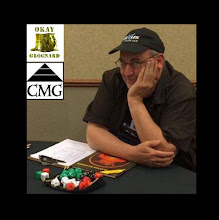Divine Right (1979) is another one of those classic early games that I love to play every year, more than once if it can be arranged. This year, in the warm up to Gary Con, I broke it out for my weekly group. While I don't think it had as big an impact as Civilization, they seemed to be warming to it. Of course, we only played the basic game and it was slow going even then. Sometimes I forget that the complexity of some older games will put modern players on their heels right out of the gate and make getting into a game. I don't want to have a "back in the day" moment but it is true that back then when we knew a particular game was going to be played we would spend time before that day learning what we could about it. This, of course, was pre-Internet which makes it more amazing. Imagine the number of phone calls and stop-overs the person who had the rule book had to handle? They were the conduit to everyone getting a running start at the big day and maybe a leg up. Nowadays, time spent between games for gaming won't be spent on those games but other games with an immediate gaming-fix. Prep seems like a dirty word despite how much easier it is in these modern times. And here we are in the same place where this game was first published by TSR roughly 37 years ago. Whoops. Looks like I had my moment anyway. Anyway . . .

The description on Board Game Geek is as follows:
Classic game of fantasy empires clashing. Each player controls a unique realm and attempts to use diplomacy and might to ascend to rulership. A colorful map and a host of fantastic creatures bring out a fleshed out fantasy world.
You expected more? Maybe it does need some additions . . . such as:
The mechanics of this game are fine if you like wargames. If you're more of a modern-era boardgamer, it might be too fiddly. The base game is fairly simple once you know how movement, sieges, and combat work. The Advanced game adds tons of additional factions, powers, magic, that all are basically sub-systems and work in their own peculiar ways. A sentence or two explains each one but with dozens of them, it requires keeping the rule book to hand.

As I said, we stuck with the basic game and played about 10 of the possible 20 turn game before the time on our evening ran out. At that stage, one player was far enough in the lead to call it a decisive victory. I did mention at the time about the changing fortunes in Divine Right, how a few bold moves while certain allies were controlled, could change that lead in a turn, and how a player could get knocked out of the game but still win if in possession of enough points. Nevertheless, I didn't push for making this a two-week affair. We did that with Civilization but the circumstances of that game are different. And, since with Divine Right we were only playing the basic game, stretching it out further was less incentivized. We have played some older wargames in the past but I'm not sure this group feels the pay off on most of them is worth the effort. Some loved Civ and enjoyed parts of Divine Right, but some of the other historical games left them cold. Even wargamey boardgames don't make it to the table very often. That's okay though. There are plenty of more straightforward modern games to play. They also seem to enjoy some minis wargaming so perhaps next week I will have some tales of that to blog.

We played a basic game and did not include either "Magic" kingdom. Muetar was neutral and was the last of the non-player kingdoms to be controlled by a player. The Dwarves managed to snag Mivior early but struggled to get Pon, then lost them, but gained them again later. Hothior brought the Trolls on his side early and pulled the loyal card for them, which made the a very good ally to help defend their homeland. Rombune sat on his hands most of the game thinking somehow an opportunity would arise where there was no risk and easy pickings but also had no like with mercs. Shucassam picked up the Elves (at half strength), the Goblins, and a very unstable Immer and swept south, forcing Muetar into play but making the most of his allies in taking a stronghold in north Immer and knocking off their leadership. All the Dwarves could do, as they kept losing population to events, was harry Hothior with Mivior and sit on The Gathering so they couldn't do an end-around with their Troll allies. In the end, Shucassam was the only one able to get much traction of VP by turn ten when we ran out of time for the evening. Still a good game but Hothior and the Dwarves needed Rombune to be threatening Shucassam to tie up some of their forces so we could do something in the north about Shucassam's allies without worrying about them in the south as well.
A closer examination of board and miniatures Wargaming.
Please Like, Share, Plus, Tweet, Follow, and Comment!






No comments:
Post a Comment